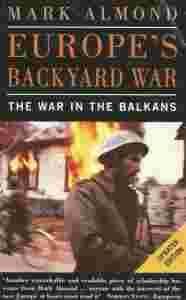|
Part 1: The Outbrake of War, 1991
Part 2: Yugoslav History, 1[zasłonięte]804-19 (1[zasłonięte]804-19; 1876; 1[zasłonięte]914-19; Wartime 1941-44; Tito; After Tito; Kosovo: Myth in the Service of Aggression)
Part 3: War (Croatia 1991-92; The Peacemakers; Bosnia 1992-93; Last Chances for peace)
Part 4: Grim Futures - Some Conclusions (The Outlook for the post-Yugoslav Balkans; From the Balkans to the Baltics)
______________
In an attempt to piece together the tragic events in the Balkans, this book analyzes a conflict that has shocked Western nations not only because of its savagery but also because of its roots in a nationalist fervour which had seemed a thing of the past during the relative stability of the Cold War years. Historian Mark Almond examines the course of the Yugoslavian conflict itself, and looks at the worrying wider implications for the former USSR and other multi-national states forced together by 19th and early-20th-century empire-building.
Recenzje:
THE INDEPENDENT by MICHAEL SHERIDAN Sunday, 24 July 1994
THERE is a villain stalking the pages of Mark Almond's book about the new Balkan War, but it is not President Slobodan Milosevic of Serbia, or even that ghastly parody of the psychiatric profession, Radovan Karadzic. It is the sinister figure of M Jacques Poos.
Many readers may not find their moral indignation greatly excited by M Poos, who is guilty of being the foreign minister of the Grand Duchy of Luxembourg, but to the author he seems the incarnation of federalism and Euro-folly, a well-meaning idiot whose theories and pretensions directly contributed to disaster.
An early chapter of the book revisits the Eastern question of the 1870s, to look at the conflict between Gladstone and Disraeli over British intervention in the decaying realms of Ottoman Europe. Then, as now, the arguments about Britain's national interest and her moral duty divided political opinion and gave rise to a torrent of pamphlets and literature. Then, as now, the fates of far-off peoples were evoked as useful propaganda in the service of domestic political conflict.
This book fits admirably into the tradition of the late 19th century. It contains elements of historical analysis, but its dominant theme is polemical. It sets out to demonstrate the futility of federal structures, whether inside Tito's Yugoslavia or among the states of Western Europe. It stigmatises the present Conservative Government and pours scorn on the European Union and the United Nations for attempting to mediate without the use of force. It is Euroscepticism as history.
One result of this approach is that the mediators, not the war-makers, attract the author's fiercest ire. Enter M Poos and his fellow foreign ministers, attempting to settle a Balkan war as if it were a dispute over fishing quotas. Lord Carrington, whom Mr Almond writes off as an invertebrate grandee, moves with languid futility through a ritual of negotiation. Lord Owen succeeds him, but Mr Almond does not much like Lord Owen either. As scathing aside succeeds dismissive epithet, the pamphleteering becomes heated.
Douglas Hurd, whom the author predictably ranks somewhere between Lord Halifax and Lord Haw-Haw, once defined his ideal foreign policy as a mixture of Gladstone and the saloon bar. It would be useful to have a little less of the saloon bar in British theorising about the former Yugoslavia. Noel Malcolm's recent study of Bosnian history was an exception because its arguments rested upon great scholarship. One may also disagree with Norman Stone's partisan writings on modern Croat politics while enjoying his grasp of Hapsburg culture and sweeping view of Balkan history.
Such work shows that passion need not be incompatible with elegance, but among the deadening effects of propaganda is that it is rarely deployed with economy. Mr Almond is at least economical with his heroes. He does not mind the Croats, considering Dr Franjo Tudjman a flawed but misunderstood leader. He defends Germany, although, of course, he is unable to absolve Helmut Kohl from the stain of Eurofederalism. The one truly heroic figure lurks in the shadows. She emerges to demand action in 'the most trenchant voice decrying the moral and political bankruptcy of the West's crocodile tears'. In contrast, naturally, to her appeasing successor, John Major, who languishes in a 'pit of moral and political decay'. Here the circle closes and we return to 1876, with distant wars mirroring domestic schism. Mark Almond may have set out simply to write a book about the Balkans. He has vividly revealed the Balkanisation of conservative politics.
________________
Mark Almond is a writer and lecturer in Modern History at Oriel College, Oxford.
Almond holds a Master's degree (M.A.), and is the Chair of the British Helsinki Human Rights Group (which despite its name is not affiliated with the Helsinki Committee for Human Rights). He has served as an election observer under the aegis of the BHHRG in a number of countries including Georgia and Ukraine.[1] Almond has been critical of what he characterizes as Western interference with democracy, such as the activities of George Soros.
His research interests lie in 19th century and 20th century Central-Eastern Europe; Almond has written a biography of Nicolae and Elena Ceauşescu, a study of Albanian migration, and a study of the Bosnian War in its historical context. He has recently been teaching a course on 18th Century France, focusing on the writings of Alexis de Tocqueville.
Now he is giving courses on European History in Bilkent University.
Almond also writes articles for national papers such as New Statesman, National Review, and The Mail on Sunday. Now he is giving lectures in Bilkent University in Turkey.
|

